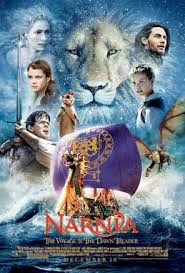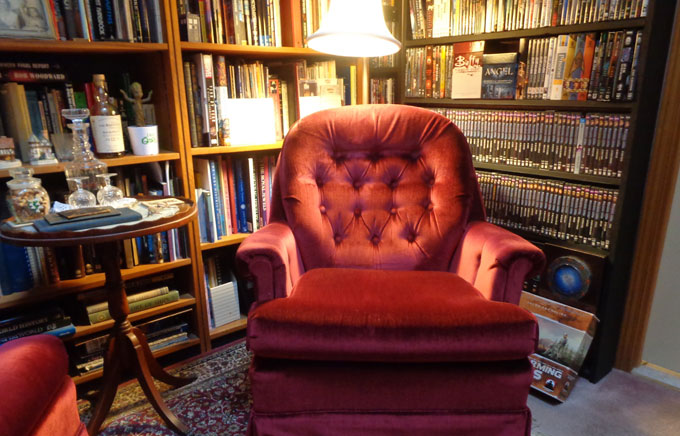
Three Narnian years after the events of Prince Caspian, Lucy (Georgie Henley) and Edmund Pevensie (Skandar Keynes) are staying with their insufferable cousin Eustace Scrubb (Will Poulter) while Peter and Susan are in America with their parents. British books for children always have a mean and arrogant character; I think it’s because of their school system. World War II continues, but Edmund is still too young to enlist. Somehow, a magical painting of a ship transports the three of them to Narnia and dumps them in the ocean.
They are rescued by the gorgeous Dawn Treader, sailing with the usual Narnian crew of Fauns and Minotaurs and Men. Prince Caspian (Ben Barnes) is on a voyage to rescue the seven Lords of Narnia, who were banished by the usurper, Caspian’s Uncle Miraz, before his defeat. The children are invited to join the expedition, though I don’t see what choice they have. In the Lone Islands, Caspian and Edmund are imprisoned, Lucy and Eustace sold as slaves. One of the Lost Lords, Lord Bern (Terry Norris), whom Caspian meets in prison, tells him that slaves who are not sold are sacrificed to a green mist. The crew of the Dawn Treader rescues them all. Lord Bern, who becomes the Governor, gives Caspian a special sword—one of seven bestowed on the Lords by Aslan.
On another island, Lucy is taken by invisible Dufflepuds who force her into the manor of the magician Coriakin (Billie Brown) to find a visibility spell for them. Coriakin talks the ship’s crew into defeating the mist by laying the seven swords on Aslan’s table on Ramandu’s Island. Lucy recites a beauty incantation and enters a dream in which she is Susan and Narnia does not exist. The image of Aslan (voice of Liam Neeson) scolds Lucy for her self-doubt.
Another sword is recovered from a pool that turns everything, including unlucky lords, into gold. The sword, being magical, is not turned to gold. Eustace steals a treasure. While looking for him, Edmund and Caspian find the remains of another lord and recover his sword. A dragon appears and is driven away. No one knows at first that the dragon is Eustace, transformed by the treasure he has stolen. The swashbuckling and crazy-brave mouse Reepicheep (voice of Simon Pegg because he was thought to be more mature-sounding than Eddy Izzard) befriends the dragon, who becomes useful to the crew. Director Michael Apted gave the dragon a much bigger role in the movie than in the book and penned a few other changes
They arrive at Aslan’s table and find three lords sleeping. They place the swords but one is missing. A star descends from the sky in the form of Lilliandil (Laura Brent), a beautiful woman, who guides them to the Dark Island, where they find the last lord. Caspian is instantly smitten with Lilliandil—perhaps this reminds you of Aragorn and Arwen Evenstar in Lord of the Rings. Edmund’s fear takes shape as a sea serpent that attacks the ship, and Eustace the Dragon battles the creature, until he is injured and flies away. Aslan transforms him back into a boy and sends him to Ramandu’s Island with the last sword. While the crew battles the sea serpent, the mist takes shape as the White Witch (Tilda Swinton). Eustace reaches the table, struggles against the mist, and places the last sword. The swords release their magic and give Edmund the power to slay the sea serpent. The sleeping lords awake, the mist is dispersed, and the slaves abducted by the mist are liberated.
Eustace, Lucy, Edmund, Caspian, and Reepicheep sail to a mysterious coast. Aslan appears on the beach and tells them his country lies beyond. They may join him there, but they will never return. Caspian refuses because of his kingly duties, but Reepicheep goes on with Aslan’s blessing. The lion opens a portal so Lucy, Edmund and Eustace may return to Earth, but warns Lucy and Edmund they are too old to visit Narnia again. He suggests they find him on Earth by another name (I wonder who that could be) and sends them home.
C.S. Lewis and J.R.R. Tolkien met in 1926, at a Merton College English Faculty gathering, in Oxford. Like-minded in nearly every way, they became fast friends, with the occasional feud. They shared experiences in the trenches of World War I, loss of parents, and a passionate love of archaic literature. They hung out at the Bird and Baby, the 17th Century pub where their literary club The Inklings met on Tuesday mornings from 1937 to 1962. They would read their works aloud for each other in “Beowulf and Beer” sessions. I really can’t help thinking of the Prancing Pony in Bree. If you asked me who, living or dead, I would invite for dinner, I would simply ask to be present any Tuesday morning in that pub. Treebeard’s manner and booming voice was modeled after that of C.S. Lewis.
